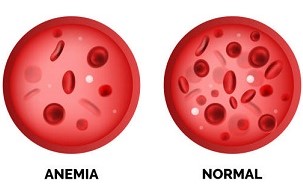Blood constitutes approximately 7-8% of body weight. Despite being a small percentage, its significance cannot be overstated. Blood functions as a continuous supporter, working around the clock to deliver essential substances to every part of the body. It is irreplaceable, as it cannot be artificially created or manufactured. The primary role of blood is to transport oxygen, which is vital for sustaining life. Any abnormalities in the blood or its functions can lead to life-threatening consequences.
Anemia, also known as a deficiency of blood, is a condition in which the blood lacks sufficient healthy red blood cells to transport an adequate amount of oxygen to the body's cells. A normal red blood cell (RBC) count ranges from 4.7-6.1 million cells/mcL for men and 4.2-5.4 million cells/mcL for women. Anemia is commonly detected during routine blood tests as low hemoglobin levels. Hemoglobin, a crucial protein in red blood cells, is responsible for carrying oxygen and carbon dioxide between the lungs and tissues. It also plays a role in maintaining the body's acid-base balance.
Symptoms of anemia include brittle nails, fatigue, pale skin, a rapid heartbeat, and lightheadedness.
Sickle cell disease refers to a group of conditions that cause red blood cells to become abnormally shaped and prone to breaking down. In some types of anemia, red blood cells may have irregular shapes or sizes, either larger or smaller than normal.
Following are the symptoms you may experience
Feeling low on energy and fatigued can occur due to a lack of red blood cells (RBCs), which are essential for delivering oxygen to your cells to generate energy.
Drowsiness
Increased thirst
Leg cramps, cold hands, or feet
Anxiety, headache
Chest pain
Pale or yellowish skin
Dyspnea
If you experience any of these symptoms, it is crucial to consult a doctor.
Anemia exists in various forms, but the most common type is iron deficiency anemia. This condition arises when the body lacks sufficient iron, a key component in hemoglobin production. Approximately 70% of the body's iron is found in hemoglobin. When iron levels are inadequate, hemoglobin production decreases, preventing the body from receiving enough oxygen. Women of childbearing age are particularly susceptible to iron deficiency anemia, often due to heavy menstrual bleeding or the increased iron demands of pregnancy. Another type of anemia is sickle cell anemia, a genetic disorder caused by a mutation in the hemoglobin beta (HBB) gene. If both parents carry the mutation, there is a risk that their child may inherit sickle cell anemia. This condition causes red blood cells to become sickle-shaped and less flexible, which impairs their ability to flow through blood vessels. Treatment for this disorder typically involves blood transfusions and, in some cases, a bone marrow transplant.
Have a look at the causes
Lacking folate, vitamin12, and iron increases your risk of anemia.
Pregnancy or menstruation (due to heavy blood loss).
Decreased number of RBCs or malfunctioning.
Conditions such as ulcers, gastritis, and cancer.
Post-surgery.
Enlarged spleen; this condition traps red blood cells and destroys them.
Kidney or liver disease.
Family history.
Anemia is a significant health issue, particularly among women. It can also impact children's language and motor skills, contribute to childbirth complications and deformities, and weaken the immune system. Proper medical care is essential for treating anemia, and certain types of anemia can even be prevented. Adopting the following preventive measures may help:
Don't let your body go without the iron it needs - include plenty of green vegetables in your diet.
Avoid drinking coffee or tea, as they can interfere with iron absorption.
Focus on nutrient-dense and vitamin-rich foods, particularly those high in vitamin B12 and folic acid.
Women of childbearing should consider taking iron supplements to meet their body's increased demands.
Incorporate vitamin C into your meals, as it enhances iron absorption.
Engage in regular exercise to improve gut health and promote better absorption of nutrients and vitamins.
To effectively treat and manage anemia, it is crucial to identify the specific type of anemia. A complete blood count (CBC) test is typically used for diagnosis. Based on the results, your doctor will determine whether the anemia is due to dietary deficiencies or an underlying health issue.
Here are some ways to manage anemia
Patients with severe anemia (Hb < 4g/dl) should be hospitalized, as they are at risk of developing cardiac failure.
Incorporate pranayama or other breathing exercises into your daily routine to improve lung capacity, which enhances the oxygen-carrying ability of red blood cells.
On an empty stomach, drink one or two glasses of warm water with lemon juice and 1-2 tablespoons of honey. Honey is rich in iron, copper, and manganese, while lemon improves iron absorption.
Anemic patients should ensure at least 8 hours of undisturbed sleep every night.
Add dates and bananas to your diet to naturally boost energy levels.
With proper guidance from your doctor, develop a routine that incorporates medication, exercise, and a well-balanced diet. Trust the process, avoid stress, and don't let fear disrupt your progress.
|

